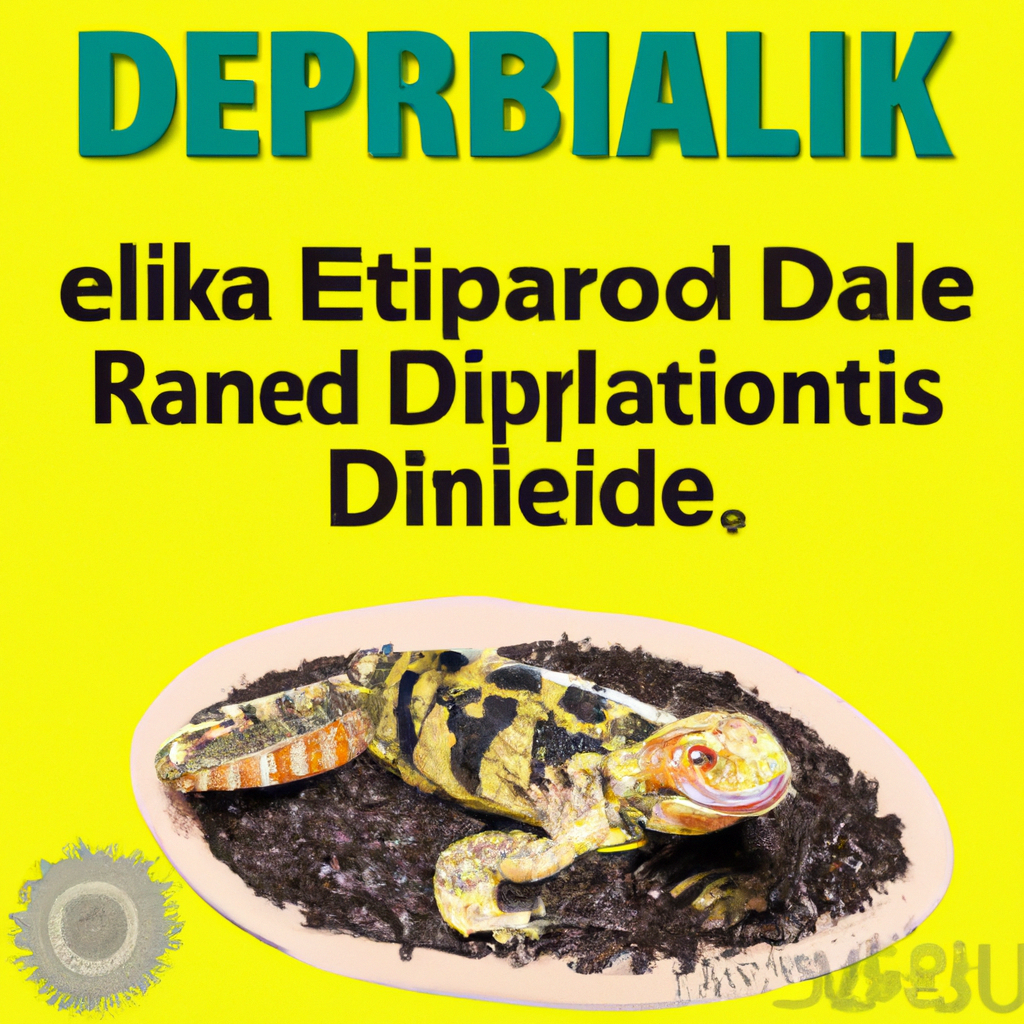Are you a reptile owner looking for the best diet for your scaly friend? Look no further! In this article, we will guide you through the importance of a balanced diet for reptiles and provide valuable tips on how to ensure your pet receives all the essential nutrients it needs to thrive. From the right combination of proteins and vegetables to the importance of proper hydration, we’ve got you covered. Get ready to take your reptile’s diet to the next level and watch them flourish with a well-balanced meal plan!

Benefits of a Balanced Diet for Reptiles
Providing Essential Nutrients
A balanced diet is essential for the overall health and well-being of reptiles. Just like humans, reptiles need a variety of nutrients to support their bodily functions and maintain optimal health. A balanced diet ensures that reptiles receive all the essential nutrients they need, including proteins, carbohydrates, fats, vitamins, and minerals. These nutrients play a vital role in the growth, repair, and maintenance of the reptile’s body.
Promoting Growth and Development
A balanced diet is crucial for the growth and development of reptiles, especially for young ones. Nutrients such as proteins and calcium are particularly important for proper bone development and muscle growth. Without a balanced diet, reptiles may experience stunted growth and developmental issues, which can have long-lasting negative effects on their overall health.
Boosting Immune System
A well-balanced diet is essential for boosting the immune system of reptiles. Just like in humans, a strong immune system helps reptiles fight off diseases, infections, and parasites. Nutrients such as vitamins A, C, and E, as well as zinc and selenium, are known to support a healthy immune system. By providing a balanced diet, reptile owners can help ensure that their pets have the necessary tools to fight off illnesses and maintain optimal health.
Maintaining Optimal Body Weight
A balanced diet is crucial for maintaining an optimal body weight in reptiles. Obesity can lead to a range of health issues, including heart problems, liver disease, and joint pain. On the other hand, underweight reptiles may suffer from a weakened immune system and reduced energy levels. A balanced diet that includes the right amount of proteins, carbohydrates, and fats can help reptiles maintain a healthy body weight and prevent the onset of weight-related health problems.
Choosing the Right Foods for Reptiles
Understanding the Natural Diet of Reptiles
When selecting foods for reptiles, it is essential to understand their natural diet in the wild. Different reptile species have different dietary requirements based on their natural habitat and feeding habits. Some reptiles are carnivorous, feeding on insects, rodents, or other reptiles, while others are herbivorous, primarily consuming plants and vegetables. Additionally, some reptiles are omnivorous, meaning they eat both plant and animal matter. Understanding the natural diet of the reptile species you are caring for is crucial for providing them with the right foods.
Identifying Nutritional Requirements
Once you understand the natural diet of your reptile, it is vital to identify their specific nutritional requirements. This includes determining the right balance of proteins, carbohydrates, fats, vitamins, and minerals that your reptile needs to thrive. The nutritional requirements may vary depending on the age, species, and health condition of the reptile. Consulting a reptile veterinarian or nutritionist can help you determine the precise nutritional needs of your reptile and create a diet plan that meets those requirements.
Selecting High-Quality Foods
Selecting high-quality foods is essential for ensuring that your reptile receives the proper nutrients and avoids potential health risks. When choosing foods for your reptile, opt for fresh, organic, and pesticide-free options whenever possible. For carnivorous reptiles, select feeders that are free from antibiotics or hormones and are nutritionally balanced for the species. For herbivorous reptiles, choose a variety of fresh fruits, vegetables, and leafy greens that are safe and appropriate for their species. Investing in high-quality foods will contribute to the overall health and well-being of your reptile.
Avoiding Toxic or Harmful Foods
In addition to selecting high-quality foods, it is essential to avoid toxic or harmful foods that can negatively affect your reptile’s health. Some foods, such as onions, garlic, and avocados, are toxic to reptiles and should never be included in their diet. Other foods may be unsafe due to potential contaminants or a high pesticide residue. Reptile owners should research and avoid foods that have been known to cause health issues or pose a risk to their reptiles.
Creating a Balanced Meal Plan for Reptiles
Including a Variety of Food Groups
When creating a balanced meal plan for reptiles, it is crucial to include a variety of food groups that meet their specific nutritional requirements. For herbivorous reptiles, this may include a mix of leafy greens, vegetables, and fruits. Carnivorous reptiles may require a range of insects, rodents, or other animals suitable for their species. Omnivorous reptiles benefit from a combination of both plant and animal matter. By offering a variety of foods, reptiles can receive a wide array of nutrients and enjoy a more balanced diet.
Balancing Protein, Carbohydrates, and Fats
Protein, carbohydrates, and fats are macronutrients that reptiles require in different proportions. Carnivorous reptiles, such as snakes or lizards, require a higher proportion of proteins in their diet to support their muscle development and energy needs. Herbivorous reptiles, like tortoises or iguanas, need a greater emphasis on carbohydrates from plant-based foods for energy. Balancing these macronutrients ensures that reptiles receive the appropriate fuel for their unique dietary needs.
Vitamin and Mineral Supplementation
While a balanced diet should ideally provide all the necessary vitamins and minerals, reptiles may still benefit from vitamin and mineral supplementation. This is especially true for captive reptiles, as their environment may not provide the same nutrient availability as their natural habitat. Calcium and vitamin D3 supplementation is particularly important for reptiles to prevent metabolic bone disease. Reptile owners should consult with a veterinarian or nutritionist to determine if and how to supplement their reptile’s diet to meet their specific needs.
Feeding Schedule and Portion Sizes
Establishing a feeding schedule and portion sizes is crucial for maintaining a balanced diet for reptiles. The frequency of feeding depends on the reptile’s age, species, and metabolic rate. Young reptiles generally require more frequent meals, while adult reptiles may require fewer feedings. It is essential to monitor portion sizes to prevent overfeeding or underfeeding, which can have negative consequences on the reptile’s health. Regularly adjusting the feeding schedule and portion sizes based on the reptile’s growth and nutritional needs ensures that they receive the appropriate amount of food for their well-being.
Feeding Strategies for Different Reptile Species
Carnivorous Reptiles
Carnivorous reptiles, such as snakes or monitor lizards, have specific feeding strategies. They rely on a diet consisting primarily of other animals, including insects, rodents, or even small birds or mammals. Feeding live or pre-killed prey items is often the preferred method for these reptiles, as it mimics their natural hunting behavior and provides mental stimulation. It is important to ensure that the prey items are appropriate in size and nutritionally balanced to meet the reptile’s needs. Care should be taken to avoid feeding wild-caught prey that may be contaminated or carry parasites.
Herbivorous Reptiles
Herbivorous reptiles, like tortoises or iguanas, require a diet rich in plant material. They primarily consume leafy greens, vegetables, fruits, and occasionally flowers or other plant matter. For these reptiles, it is essential to offer a mix of different plant foods to encourage variety and ensure they receive all the necessary nutrients. Care should be taken to avoid toxic or harmful plants and to provide a balanced diet that meets the reptile’s nutritional requirements.
Omnivorous Reptiles
Omnivorous reptiles, such as bearded dragons or blue-tongued skinks, have a more flexible diet that includes both plant and animal matter. They may consume a combination of insects, small vertebrates, fruits, vegetables, and even carrion in the wild. A balanced diet for omnivorous reptiles should include a mix of both plant and animal foods to provide the necessary nutrients. It is important to strike the right balance to prevent nutritional deficiencies or excesses.

Feeding Techniques for Reptiles
Whole Prey Feeding
For carnivorous reptiles, feeding whole prey items is a common and natural feeding technique. This method involves providing the reptile with whole animals, such as mice, rats, or chicks, which they will consume entirely. It offers a complete nutritional package and allows the reptile to exhibit their natural hunting behavior. However, reptile owners must ensure that the prey items are nutritionally balanced and appropriate in size for the reptile to avoid any potential health issues.
Prey Item Enrichment
To provide mental stimulation and mimic natural feeding behavior, prey item enrichment can be implemented. This involves introducing variety into the diet by offering different prey items, such as insects with different shapes, sizes, or textures. Additionally, reptile owners can consider using enrichment devices or puzzles to make hunting for the prey more challenging and engaging for the reptile. Prey item enrichment encourages natural behaviors and mental stimulation, contributing to the overall well-being of the reptile.
Supplemental Feeding Methods
In some cases, reptiles may require supplemental feeding methods to ensure they receive all the necessary nutrients. This is particularly common in captive reptiles that may not have access to the same variety of foods as their wild counterparts. Supplemental feeding can involve the use of vitamin and mineral supplements, specialized diets, or fortified prey items. Reptile owners should consult with a veterinarian or nutritionist to determine if and how to implement supplemental feeding for their reptile to maintain a balanced diet.
Common Nutritional Deficiencies in Reptiles
Vitamin Deficiencies
Vitamin deficiencies are a common nutritional issue in reptiles and can lead to various health problems. Vitamin D3 deficiencies can cause metabolic bone disease, which can result in weakened bones, deformities, or fractures. Vitamin A deficiencies may lead to issues with vision, skin, or immunity. Reptiles that do not receive proper exposure to natural sunlight or UVB lighting are particularly prone to vitamin deficiencies. Providing a balanced diet that includes foods rich in vitamins and ensuring appropriate exposure to sunlight or UVB lighting is essential to prevent vitamin deficiencies.
Mineral Deficiencies
Mineral deficiencies, particularly calcium deficiencies, can also occur in reptiles. Calcium is essential for proper bone development and muscle function. Reptiles that do not receive enough dietary calcium may develop soft or brittle bones, metabolic bone disease, or muscle weakness. It is crucial to provide calcium-rich foods and ensure proper absorption of calcium by offering a balanced calcium-to-phosphorus ratio. Calcium supplements may be necessary for reptiles that do not receive adequate calcium through their diet alone.
Protein Deficiencies
Protein deficiencies can occur in reptiles that do not receive enough high-quality proteins in their diet. Proteins are vital for muscle development, immune system function, and overall growth. Reptiles with protein deficiencies may experience slowed growth, reduced muscle mass, or weight loss. Providing a balanced diet that includes appropriate amounts of high-quality proteins, such as insects or other animal matter, is crucial to prevent protein deficiencies and promote optimal health.

Signs of an Unbalanced Diet in Reptiles
Lack of Appetite
One of the first signs of an unbalanced diet in reptiles is a lack of appetite. Reptiles that are not receiving the necessary nutrients may lose interest in food or refuse to eat altogether. A sudden change in appetite or prolonged lack of interest in food should be taken seriously and may indicate a nutritional issue that needs to be addressed.
Weight Loss or Gain
An unbalanced diet can lead to weight loss or gain in reptiles. Reptiles that are not receiving the appropriate nutrients may experience weight loss and appear thin or emaciated. On the other hand, excessive feeding or a diet high in fat may result in weight gain or obesity. Monitoring the reptile’s weight and body condition can help identify any potential issues with their diet.
Poor Growth or Development
Reptiles that are not receiving a balanced diet may exhibit poor growth or development. Young reptiles require adequate nutrition for proper bone and muscle development. If a reptile is not growing or developing as expected, it may be a sign that their diet is lacking essential nutrients. A balanced diet that meets the reptile’s specific nutritional requirements is crucial for healthy growth and development.
Changes in Skin or Shell Condition
An unbalanced diet can also affect the skin or shell condition of reptiles. Reptiles that lack appropriate nutrition may develop rough, dry, or flaky skin. Shell abnormalities, such as soft or pyramided shells in tortoises, can also be a result of an unbalanced diet. Regularly inspecting the reptile’s skin or shell condition can help identify any potential issues related to their diet.
Consulting a Reptile Veterinarian or Nutritionist
Importance of Professional Guidance
Proper nutrition is vital for the health and well-being of reptiles. When it comes to creating a balanced diet for reptiles, seeking professional guidance is highly recommended. Reptile veterinarians and nutritionists have the expertise and knowledge to assess the specific nutritional needs of reptiles and provide specialized recommendations. They can help determine the right balance of nutrients, address any nutritional deficiencies, and ensure that the diet plan is appropriate for the reptile’s species, age, and health condition.
Creating a Customized Diet Plan
Every reptile is unique and may require a customized diet plan to meet their specific needs. Reptile veterinarians or nutritionists can create a customized diet plan that considers factors such as the reptile’s species, age, size, activity level, and any existing health issues. This personalized approach ensures that the reptile receives the optimal nutrition to support their overall health and well-being.
Monitoring Nutritional Status
Regular monitoring of the reptile’s nutritional status is essential to ensure their diet is balanced and meets their needs. Reptile veterinarians or nutritionists can help monitor the reptile’s body condition, growth rate, skin or shell condition, and even perform blood tests to assess their nutritional status. Regular check-ups and evaluations allow for adjustments in the diet plan as needed to maintain the reptile’s optimal health.
Regular Health Check-ups
In addition to monitoring the reptile’s nutritional status, regular health check-ups with a reptile veterinarian are crucial for their overall well-being. These check-ups involve a thorough examination of the reptile’s overall health, including their diet and nutritional needs. Reptile veterinarians can provide guidance on any necessary adjustments to the diet plan and ensure that the reptile is thriving on a well-balanced diet.

Conclusion
Providing a balanced diet for reptiles is essential for their overall health and well-being. A balanced diet not only provides essential nutrients but also promotes growth and development, boosts the immune system, and helps maintain a healthy body weight. Choosing the right foods, creating a balanced meal plan, and considering the specific needs of different reptile species are key factors in providing optimal nutrition. Regular monitoring and consulting with a reptile veterinarian or nutritionist can ensure that the diet is balanced and meets the reptile’s nutritional requirements. By prioritizing their diet, reptile owners can contribute to the long and healthy lives of their beloved reptilian companions.
